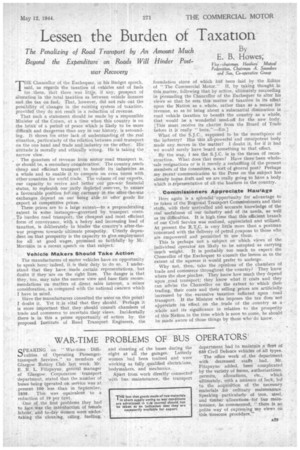Lessen the Burden of Taxation
Page 31

If you've noticed an error in this article please click here to report it so we can fix it.
The Penalizing of Road Transport by An Amount Much Beyond the Expenditure on Roads Will Hinder Postwar Recovery
E. B. Howes;
Vice chairman Hauliers' Mutusd Federation, Chairman A. Saunders and Son, Co-operative Group
HE Chancellor of the Exchequer, in his Budget speech, I said, as regards the taxation of vehicles and of fuels for .them, that there was little, if any, prospect of alteration in the total taxation as between vehicle licences and the tax on fuel. That, however, did not rule out the possibility of changes in the existing system of taXation, provided they do not result in a reduction of revenue,
That such a statement should be made by a responsible Minister of the Crown, at a time when this country is on the brink of a period of peace which is likely to be more difficult and dangerous than any in our history, is astounding. It shows his utter lack of understanding of the real situation, particularly of the relation between road transport on the one hand and trade and industry on the other.. His attitude ,is morally and ethically wrong. He is taking the narrow view.
The quantum of revenue from motor road transport is, or should be, -a secondary cOnsideration. The country needs cheap and efficient transport., to benefit its industries as, a whole and to enable it to compete on even terms with other countries for world trade. The volume of our exports, our capacity to revive and better out pre-war 'financial status, to replenish our ,sadly depleted reserves, to ensure a favourable position for our currency in the after-the-war exchanges depend on our being able to offer goods for export at competitive prices.
These prices are to a large extent—to a preponderating extent in some instances—governed by transport costs' To burden road transport, the cheapest and most efficient form of conveyance, with a heavy and increasing load of taxation, is deliberately, to hinder -the country's after-thewar progress towards ultimate prosperity. Utterly dependent on that prosperity is the capacity to give employment for all at good wages, promised so faithfully by Mr. Morrison in a recent speech on that subject.
Vehicle Makers Should Take Action The manufacturers of motor vehicles have an opportunity to speak here: indeed, it is their duty to do so. I understand that they have made certain representations, but doubt if they are on the right lines. The danger is that they, too, may take the narrow view and base their recommendations on matters of direct sales interest, a minor consideration, as compared with the national concern which I have in mind.
Have the manufacturers consulted the users' on this point? I doubt it. Yet it is vital that they should. Perhaps it is more important that they should consult chambers of trade and commerce to ascertain their views. Incidentally there is in this a prime opportunity of action by the proposed Institute of Road Transport Engineers, the
foundation stone of which haS been laid by the Editor of "The Commercial Motor." If, by taking thought in this matter, following -that by action, ultimately succeeding in persuading the Chancellor of the Exchequer to alter his views so that he sees this matter of taxation in its effect upon the Nation as a whole, rather than as a means for revenue, so as to bringabout a substantial diminution in road vehicle taxation to benefit the country as a whole, that would be a wonderful send-off for the new body. [This must receive its charter from the Board of Trade before it is really " born.' —Eo.]
What of the S.J.C., supposed to be the mouthpiece of the industry? Has this all-powerful and cimnipotent body made any, moves in the matter? I doubt it, for if it had we would surely have heard something to that effect.
By the way. I see the S.J.C. is in the throes of reconstruction. What does that mean? Have there been wholesale resignations or is it merely a reshuffling of the present members of the committee, a sort of general post? Perhaps my recent' communicationto the Press on the subject has already bopae fruit and we are really going to have a body which is representative of all-the hauliers in the country.
'Commissioners Appreciate Haugage Here again is a splendid 'opportunity for advantage to be taken of the Regional Transport Commissioners and their staffs, with their unrivalled and accurate knowledge of the real usefulness of our industry and of its needs, as well as its difficulties. It is high. time that this efficient branch of our Civil Service was realized, appreciated and utilized. At present the R.T.C. is very little more than a postman concerned with the delivery of petrol coupons to those who are empowered and permitted to use them. This is perhaps not a subject on which views of the individual operator are likely to be accepted as carrying much weight. It is probably too much to expect the Chancellor of the Exchequer to consult the lemon as to the extent of the squeeze it would prefer to undergo.
Why not, then, take the opinions of the chambers of trade and commerce throughout the country? They know where the shoe pinches. They know how much they depend upen _road transport; they know what it costs and they can advise the Chancellor on the extent to which their trading, their costs and their selling prices are artificially increased by the excessive taxation inflicted upon road transport. If the Minister who imposes the tax does not appreciate its effect on the ,trade of the country as a whole and its significance in relation to the prosperity of this Nation in the time which is soon to come, he should be made aware of those things by those who do know.




















































